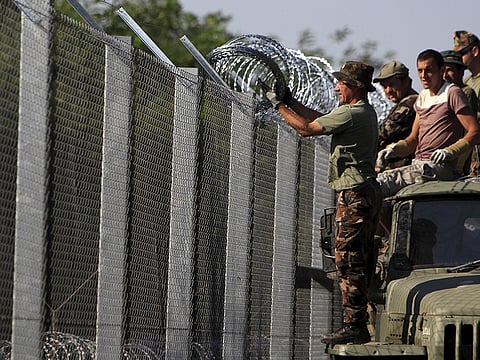Calls for action on migrant crisis after Austrian tragedy
Fifth suspected human trafficker arrested over discovery of 71 decomposing corpses

Rvszke, Hungary: Calls multiplied Sunday for Europe finally to get to grips with its ever-deadlier migrant crisis after Austria’s horrific truck tragedy, as people continued to pour into Hungary from Serbia despite a newly completed razor-wire barrier.
Hungarian police said a fifth suspected human trafficker had been arrested over Thursday’s gruesome discovery of 71 decomposing corpses in an abandoned truck on an Austrian motorway. Three children saved from another vehicle meanwhile left hospital.
Pope Francis called Sunday for “effective cooperation” against “crimes that offend all humanity”.
The truck tragedy, plus yet another Mediterranean shipwreck claiming at least 111 lives, have served as chilling reminders of Europe’s failure to cope with the influx of hundreds of thousands of migrants.
The United Nations estimates 300,000 people have fled conflict and hardship in the Middle East and Africa for a better life in Europe this year alone. Millions more sit in camps in Turkey, Jordan and Lebanon.
Some 2,500 have died in the treacherous journey, most drowning in the waters of the Mediterranean after being crammed into unseaworthy boats.
“Europe needs to stop being moved and start moving,” Italian Prime Minister Matteo Renzi said, calling again for a fairer distribution of migrants among the European Union’s 28 members.
Germany, France and Britain made a joint call for an urgent meeting of EU interior and justice ministers in the next two weeks to take “immediate action” and find “concrete steps”.
French Prime Minister Manuel Valls said that people “fleeing war, persecution, torture, oppression, must be welcomed” and should be treated with “dignity”.
And French Foreign Minister Laurent Fabius slammed as “scandalous” the attitude of certain EU members in eastern Europe in refusing to accept more migrants.
If the migrants manage to reach Greece, large numbers then trek up through the countries of the western Balkans — Macedonia called a state of emergency two weeks ago — and enter EU member Hungary.
From Hungary most want to travel onwards to prosperous western Europe, particularly Germany and Sweden.
Hungary has responded by completing on Saturday a barrier of three rolls of Nato-standard razor wire along the entire 175-kilometre (110-mile) border with Serbia, patrolled by border police with dogs and 4x4s.
Right-wing Prime Minister Viktor Orban’s government is also building a four-metre-high fence and wants to stiffen penalties for people entering illegally.
The barrier is not proving much use, however, with police saying Sunday that 3.080 migrants crossed over on Saturday, the second-highest daily total. The barrier is littered with pieces of torn clothing.
On Sunday AFP witnessed a group of around 200 migrants passing through carrying plastic bags, rucksacks and bottles of water. They called out in greeting “salam alaikum” - “peace be with you” in Arabic.
“I want the border. Where can we pass to Europe?” asked one of them, Hassan from Syria, who has been travelling for a month. “I’m a manager, that’s my baby and the uncle of my baby. In the night there is bad people, stolen our money, we were running.”
“Macedonia and Serbia has good people. In Serbia when we was at camp, I told them, I want my baby to put him into a hotel. And the police let me to go to hotel, for the child. Not for me. I don’t want anything for me.”
The five people now in custody in Hungary over the Austrian lorry are believed by police to be low-ranking members of one of the numerous and often unscrupulous human-trafficking gangs that extract exorbitant amounts of money to transport migrants.
The four already in detention on Saturday said they were innocent as a court in Hungary remanded them in custody until September 29.
The 7.5-tonne truck found in Austina contained the decomposing bodies of 59 men, eight women, a toddler and three young boys, provoking international revulsion.
The dead were thought to be Syrians and police believe they suffocated and had been dead for up to two days before the truck was discovered by motorway maintenance workers due to decomposing body fluids dripping from the vehicle.
On Saturday Austrian police said that three “severely dehydrated” children were rescued from another vehicle on Friday containing 26 Syrians, Bangladeshis and Afghans near the border with Germany.
Police spokesman David Furtner told AFP on Sunday that the three Syrian children from the “really awful” vehicle have since been discharged from hospital and had likely continued their journey with their parents into Germany.
“The van was driven by a Romanian and had Spanish number plates and arrived from Hungary,” he said. “This year we have arrested 93 people traffickers in Upper Austria state alone. Most escape though.”



